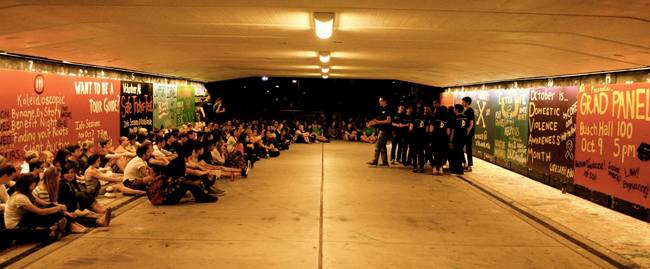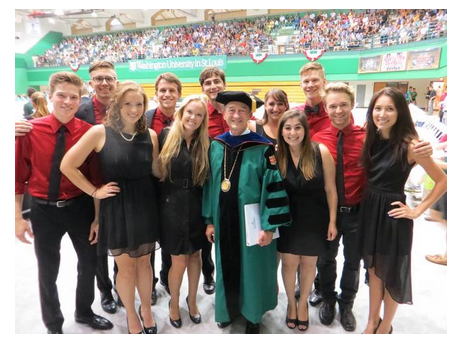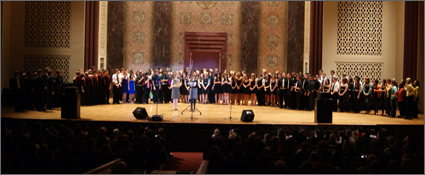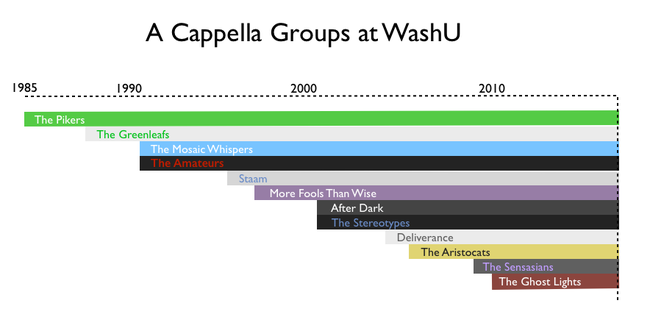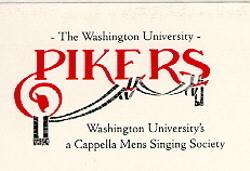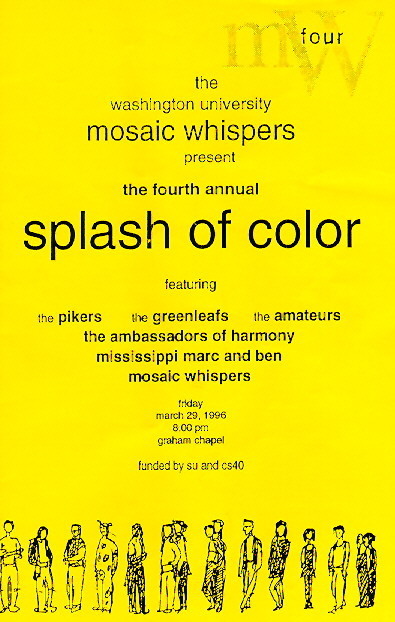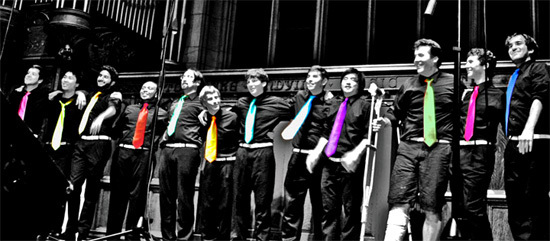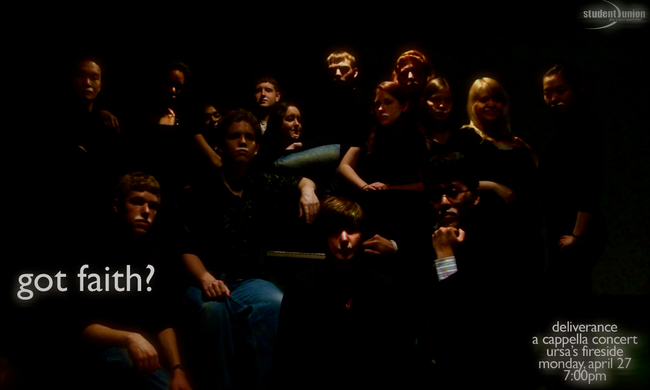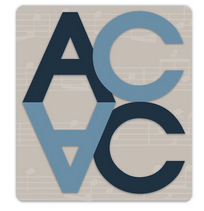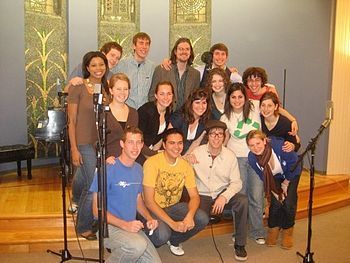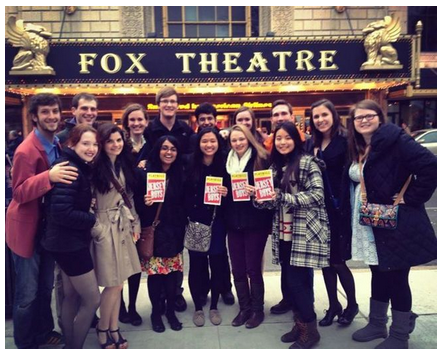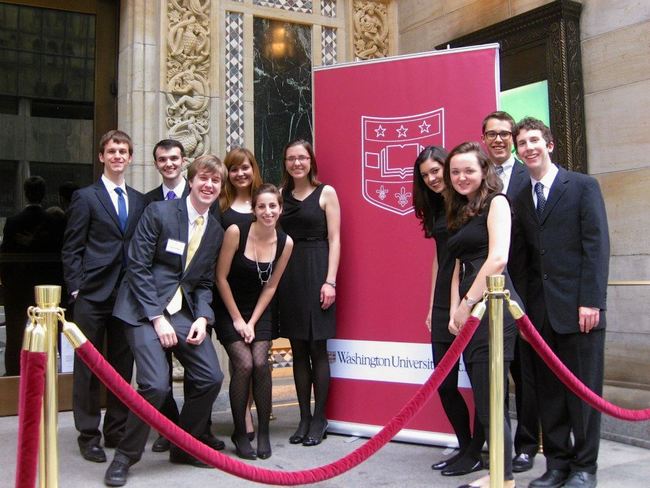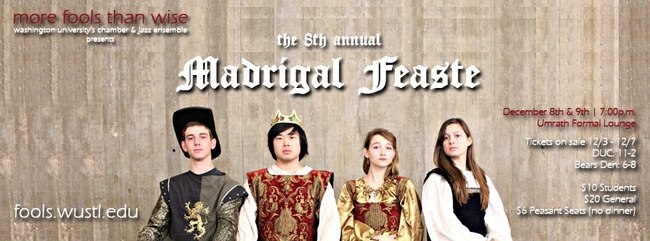A Cappella at WashU
Washington University in St. Louis is a campus full of musical life. There are plenty of opportunities for students to express themselves creatively, from Music Department sponsored ensembles and private lessons to the myriad of formal and informal student-run music groups. If you’re a freshman on campus right now, you’ve probably heard the harmonious cry ringing from the Clocktower to Brookings and beyond. Yes, it’s that time of year again - the age of dormstorming, aca-bopping and a few too many jnn’s and dmm’s…
Ladies and gentlemen, welcome to a cappella auditions.
And if you’re looking to audition, you’ve probably gone online to do a little research and found… well, really not much at all. While each group has their own website and Facebook page, there’s no source that tells the story of a cappella at WashU as a whole. I remember searching around my freshman year only to find some dated articles from 2006…
Well, much has changed since then. We are a creative and talented community that is bound together by our love to sing, and differentiated by our individual musical niches. This post is mostly intended to paint a comprehensive picture of a cappella culture at WashU for the freshmen who will be auditioning in the next few days for any of the 12 a cappella groups on campus. But it also is meant to ground some of my previous rambling about a cappella in a historical time, location and context.
If you’re looking for the short story about auditions and how you should prepare, then definitely head over to the A Cappella Advisory Council (ACAC) website. You can get an overview of the audition timeline and process (auditions start this Friday!) as well as a list of all the current groups!
But if you want to know a little more about the culture of singing on campus, read on…
A cappella is one of the largest student communities on campus. With 12 groups, there are 150+ members hailing from each academic school and discipline. Student-produced concerts fill campus venues nearly every weekend between late October and April. And while each group fosters their own identity, there is a broader connection that is felt by all. Groups come together at the beginning of the year to coordinate auditions, we enthusiastically attend each other’s concerts (and afterparties), and there’s talk of an aca-prom this year at the City Museum!
The commitment to an a cappella group can be as much as you want it to be. Groups typically will rehearse 5-6 hours per week (twice during the week and once on the weekends) and coordinate rehearsal times so that it fits in everyone’s academic schedule. At night, the 560 Music Building is buzzing with rehearsals and singers mingling during their breaks. Groups also perform around campus and in the community - anything from annual concerts, singing at student events, impromptu performances at the Underpass, dinner parties for the Chancellor or weddings around St. Louis.
And the WashU a cappella community doesn’t stay put on campus. Many groups go on annual or biennial tours, road-tripping to the Northeast, the West Coast and anywhere in between. Groups from around the region also converge on campus for singing competitions. Quarterfinal and semifinal rounds for the International Championship of Collegiate A Cappella (aka ICCA - well known from the movie Pitch Perfect) are held in Desmond E. Lee concert hall in the 560 Music Building, with groups traveling from the Universities of Michigan, Chicago, Wisconsin, Illinois, Nebraska and Minnesota and more to compete for the title of Midwest Champion and a trip to NYC for the finals.
But a cappella at WashU is much more than just the music. That’s the point of my senior project on a cappella, Beyond The Score. Singing is good for you - and there’s plenty of science and data to back that up. A cappella helps people form an identity during the transformative 4 years that are college, and cultivates individual and communal health. Singers form life long friendship with their group members, find the person that they’ll end up marrying (yes, this has happened), and develop creative/leadership skills by running student groups. Simply put, it’s fun to sing and the a cappella culture at WashU enriches the college experience overall.
This all didn’t happen by accident. We are coming up on 30 years of a cappella on campus and some pretty interesting things have occurred along the way. As it stands, there are 12 groups in ACAC and we have one of the largest and most vibrant collegiate singing communities in the nation.
Here’s the story of how that all happened…
The 1980’s
In 1985 two WashU administrators, Justin Carroll and Harry Kisker, came up with the idea of starting an a cappella group on campus. Carroll, then Director of Residential Life, heard an all-male a cappella group while on a business trip to Boston. Upon returning he and Kisker found interested students, secured funding, and the Washington University Piker Society was born. The Pikers (all-male) mark the beginning of our story. Their name comes from the 1904 World’s Fair which was held in St. Louis, and refers to the musicians who entertained attendees (known colloquially as “pikers”). Three years later, in 1988, The Pikers were joined by The Greenleafs (all-female) who take their name from WashU’s founder, William Greenleaf Eliot.
These first few years saw great success for both groups. Concerts quickly became well-attended campus events, and The Pikers and Gleafs frequently appeared on each other’s programs. The Pikers also set the precedent of a cappella groups singing at university-sponsored events, notably singing before a campus appearance by President George Bush in 1989.
WashU’s budding a cappella scene was also being noticed broadly. Groups travelled to WashU from Duke and Bucknell, as well as Yale, Oberlin, Stanford and Tufts to make guest appearances at concerts. The stage was set, and in the next decade this budding community would triple in size.
The 1990’s
The 90’s saw rapid expansion of student-led singing groups on campuses across the country, historically known as the “a cappella boom”. The groundwork for such an event was set by a tradition of classical singing societies on Ivy-League campuses and the increasing use of vocal harmony in post-war pop music (think Billy Joel, Michael Jackson, Justin Timberlake… etc.)
Two groups emerged on campus in 1991, The Mosaic Whispers (co-ed) and The Amateurs (co-ed). The Whispers emerged out of WashU’s famous Thurtene Carnival, singing at the event in the spring ‘91 and organizing later that fall to formally hold auditions. The Amateurs were founded that same year as an accompanied student-run choir, and steadily ditched their instruments and trimmed their ranks until reaching their current state.
Interestingly, one of the big cappella institutions of our day - The Recorded A Cappella Review Board (aka RARB) - was founded in a WashU dorm room. Seth Golub and Chris Tess, two Pikers, launched the online community of chat rooms and album reviews in 1993. Seth, who built the site, now works on artificial intelligence for Google but the idea lives on, with hundreds of albums being reviewed each year. And it was The Greenleafs that were the very first group to be receive an album review. The critic - none other than Adam Farb, co-founder of ICCA.
[Staam](staam.wustl.edu) (co-ed, all-Jewish) was founded later in the decade, in 1997. They were brought together by their love to sing after Shabbat dinner and their name implies it, roughly translating to “just because”. The 1998, More Fools Than Wise (co-ed, classical & jazz) appeared, forming out of the Music Department from a desire to “increase the musical opportunities for students interested in a cappella music”. Each year, Fools puts on a traditional madrigal feast that is both delightfully entertaining as it is delicious!
At the close of the decade, WashU’s a cappella scene was thriving. Each group held yearly concerts and a community was forming around the act of singing. Groups were recording CD’s, winning awards for their musicality, touring outside of Missouri and leaving an impact on the national a cappella community as a whole. But we’re still just only getting started.
The 2000’s
Two groups formed in 2001, bringing the campus total to eight. After Dark (co-ed) and The Stereotypes (all-male). The Stypes were formed as a fresh take on “stereotypical” a cappella music, and legend has it that After Dark found its beginning during the night. Side note: if you’re getting sick of the aca-puns already, well, they’re not stopping anytime soon.
At the same time, established groups were continuing to find new places to perform. The Amateurs and Whispers both competed and were recognized in the 2002 ICCA quarterfinal. Funny enough, Josh Goldwasser of the Amateurs, who won best arrangement at that competition, is also a founder of The Stereotypes - just one instance of the numerous connections between groups. Also, The Whispers and After Dark appeared on national television to an audience of millions during the broadcast of the 2004 Second Presidential Debate, held at WashU.
2004 also brought with it another new group, Deliverance (co-ed, Christian) who were founded to “use a cappella as a witness for the Gospel.”
The next year in 2005, The Aristocats (co-ed, all-Disney) were formed. Essentially (and in their own words), they’re “a bunch of overgrown kids who manage to masquerade as functioning adults.”
Another notable event of the same year was the formation of the A Cappella Advisory Council, also known as ACAC. With nine groups on campus (A-Cats hadn’t been admitted to ACAC at this point), it was becoming increasingly difficult to manage auditions fairly so that no group had an advantage. So ACAC was charged with the primary objectives of making auditions as simple, sensible and orderly as possible, as well as fostering a sense of community among the many diverse groups.
All the while, groups were continuing to record and release albums. WashU groups were finding their way onto national compilation CDs like Voices Only and and were garnering CARAs (Contemporary A Cappella Recording Awards). In 2002, the Whispers were runner-up for Best Mixed Collegiate Song and in 2008 After Dark won Best Mixed Collegiate Song and placed runner-up in Best Arrangement for the song “Mama’s Room”.
Also in 2008, two WashU groups, The Mosaic Whispers and The Amateurs, appeared on the album Ben Folds Presents: University A Cappella!. These tracks were recorded live on campus with Ben Folds himself at the 560 Music Building. Here they are in the Small Recital Hall - a common rehearsal location.
The close of the decade brought with it two more groups, bringing the total to our current number of twelve. In 2009, The Sensasians (co-ed, asian-interest) formed. Known as “the singing pandas”, they specialize in bilingual mashups, merging East and West in popular song. Finally, The Ghost Lights (co-ed, musical theatre/cinema/television) were formed in 2010.
The 2010’s to Present
So, now that we’re all caught up - what’s been going on these past few years?
Well to begin, the administration hasn’t lost touch with the vibrant singing community. Groups will join forces, organized by the Alumni Association, to sing at fundraising events and other receptions. They even flew a combination of a cappella singers to New York City in 2013 to sing for an alumni dinner.
Washington University has also turned into a frequent host of ICCA events, with many groups choosing to compete. In 2011, The Stereotypes took home title of ICCA Midwest Champion and travelled to NYC to compete at Finals, held at The Lincoln Center. They ended up placing 4th in the nation and took home Best Arrangement for the song, “Holding Out For a Hero”. Staam also regularly competes in Kol HaOlam, a national collegiate Jewish a cappella competition. In 2012 they won Best Arrangement for the song, “Hunger”.
Groups are also finding new ways to spread their music. In 2012, The Amateurs released their music video for “The Other Side”, produced by their alum Ben Jendras.
Themed concerts, dating back to the Piker’s first Jammin’ Toast in 1985, have evolved into elaborate evenings of entertainment. They’re also not limited to just vocal performances - groups will produce videos, invite instrumental or poetry ensembles to make guest appearances, and serve food and drinks. Some recent examples include Staam’s concert Staamikah Chanukah, The Ghost Lights’ concert Aca-Moms Unleashed, More Fools Than Wise’s annual Madrigal Feaste, and a Pikers concert in the Gargoyle complete with an open bar.
Outside the scope of ACAC, there are also student-led singing groups that perform around campus and at cultural events. Visions Gospel Choir regularly performs at the MLK Ceremony in Graham chapel, and Sur Awaaz will grace the Edison Theatre stage at Diwali.
And as groups age and members graduate, alumni networks begin to form. We’ve recently seen The Whispers and Amateurs 20th anniversary concert, The Greenleafs 25th anniversary concert and we’re coming up on The Pikers 30th. For each occasion, alumni will converge on campus and onstage for traditional alumni songs.
These occasions bring together singers whose ages range from 18 to 40 to join in common song and embody the rich and aged tradition of student singing at Washington University in St. Louis. What does 2014-2015 hold for this quirky campus community? Only time will tell…
Dormstorming is happening now in a common room near you. And auditions are this weekend! Visit any group’s website, talk to us in person, or visit [acac.wustl.edu](acac.wustl.edu) to learn more. Thanks for reading and hope to see you at a concert sometime soon!
